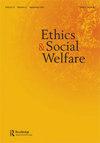道德压力工具(MDI):芬兰社会工作者职业倦怠的开发、验证与关联
IF 0.9
Q4 SOCIAL WORK
引用次数: 0
摘要
道德困扰(MD)是指专业人员由于道德能动性受限而经历的痛苦,它已成为社会工作和医疗保健领域的热门研究课题。许多...本文章由计算机程序翻译,如有差异,请以英文原文为准。
The Moral Distress Instrument (MDI): Development, Validation and Associations with Burnout among Finnish Social Workers
Moral distress (MD), the suffering experienced by professionals due to their restricted moral agency, has become a popular subject of study in the fields of social work and health care. Many of the...
求助全文
通过发布文献求助,成功后即可免费获取论文全文。
去求助
来源期刊

Ethics and Social Welfare
SOCIAL WORK-
CiteScore
1.60
自引率
20.00%
发文量
36
期刊介绍:
Ethics and Social Welfare publishes articles of a critical and reflective nature concerned with the ethical issues surrounding social welfare practice and policy. It has a particular focus on social work (including practice with individuals, families and small groups), social care, youth and community work and related professions. The aim of the journal is to encourage dialogue and debate across social, intercultural and international boundaries on the serious ethical issues relating to professional interventions into social life. Through this we hope to contribute towards deepening understandings and further ethical practice in the field of social welfare. The journal welcomes material in a variety of formats, including high quality peer-reviewed academic papers, reflections, debates and commentaries on policy and practice, book reviews and review articles. We actively encourage a diverse range of contributions from academic and field practitioners, voluntary workers, service users, carers and people bringing the perspectives of oppressed groups. Contributions might include reports on research studies on the influence of values and ethics in social welfare practice, education and organisational structures, theoretical papers discussing the evolution of social welfare values and ethics, linked to contemporary philosophical, social and ethical thought, accounts of ethical issues, problems and dilemmas in practice, and reflections on the ethics and values of policy and organisational development. The journal aims for the highest standards in its published material. All material submitted to the journal is subject to a process of assessment and evaluation through the Editors and through peer review.
 求助内容:
求助内容: 应助结果提醒方式:
应助结果提醒方式:


